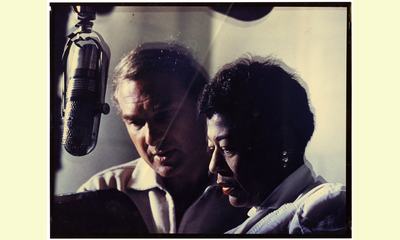|
|
Norman Granz : The man who made justice through jazz
un articulo por Kiki Chauvin
It was by listening to the radio show France
Musique every Sunday morning "You don't mess with jazz
music" that I discovered Norman Granz. This
American of Russian origin, was an impresario,
producer and patron of jazz during the civil
rights years in the United States after World War
Two.

Ella Fitzgerald and Norman Granz at microphone
click on photo to enlarge
He popularized jazz, putting his love of music
above the segregationist practices of the time
when Black and white musicicians and audiences
were kept separate in most venues. Combining
excellent musicians, small clubs and nightclubs,
he produced a group , the "JATP : Jazz At The
Philharmonic." The troupe, made up of Black and
white artists began in 1944 in Los Angeles and saw
immediately a huge success in the U.S., prior to
touring in Canada and around the world.
It was revolutionary to have a multi-racial
spectacle in the years after the war. Yet the
JATP performed in prestigious venues such as
Carnegie Hall in New York. Norman Ganz was
neither musician nor composer, and not even a
singer, but he gave wings to jazz. He gave the
right to life to music that the racist climate at
the time considered to be only "ethnic music"
where you should allow people of different skin
colors to mix!
Not only did he create a new style of jazz, more
free, more natural, more spontaneous, but he did so
with a deep respect for the musicians. In his
concerts all artists had the same rights : equal
pay, equal dressing rooms, equal benefits ...
He said himself that what he wanted was : "Combating
racism, producing good music and making money with
good music !"
He even succeeded in ending the policies of
segregation in clubs by the club-owners !
For 40 years Norman Granz produced , sponsored and
encouraged the JATP which launched the best of the
best in the world of jazz ... John Coltrane , Oscar
Peterson , Ella Fitzgerald, and Nat King Cole, just
to name a few . ..
In 1983, he abandoned his career and in 2001 he died
at the age of 87.
Norman Granz reminds me of another man, a man of
our time, musician, pianist and conductor Daniel
Baremboïm, who brings Palestinians and Israelis
together, both musicians and audiences, through
the "West-Eastern Divan Orchestra" (See CPNN,
November 26, 2012).
It's great to see how music is the language of our
universal culture, how it is a long-range harbinger
of hope for people, whether they are round, white .. .
or black !
(Click here for a French version of this article)
|








|
DISCUSSION
Pregunta(s) relacionada(s) al artículo :
What place does music have in the peace movement?,
* * * * *
Comentario más reciente:
:
As of now, there are 33 CPNN articles on this theme, which shows the great extent to which music is the universal language of peace!

|
|









